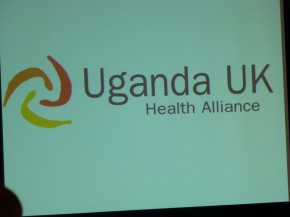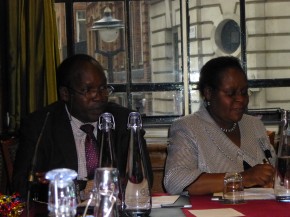
I attended the launch of the Uganda UK Health Alliance on 12th February, which was held near the Houses of Parliament in the very grand council chamber of One Great George Street. I had met many of the speakers at the meeting the previous evening, at a reception in the Houses of Parliament hosted by Lord Nigel Crisp, a strong advocate of international development (here). I am always impressed by how effectively the public spaces in the Houses of Parliament are used to bring people together and stimulate discussion and networks on a wide range of important issues.
The reception hosted on behalf of the Uganda UK Health Alliance provided time and space for those agencies and individuals based in the UK and committed to health improvement in Uganda to form closer links. (A link to the site of some of those organisations that are forming the Alliance is posted here). Chief Nurse, Ms. Enid Mwebaza, Assistant Commissioner for Health for Nursing, and Dr. George Mukone, Senior Medical Officer in the Ugandan Ministry of Health, pictured below, spoke of some of the challenges of improving health in Uganda and of the value they place on the partnerships that have been established with UK health institutions.

Another key group at the meeting were representatives of the Ugandan diaspora. These are Ugandans or UK citizens of Ugandan decent based in the UK who have maintained strong links with Uganda. There has been an interesting on-line discussion in The Guardian on the value of the diaspora in supporting development (here) and the interest and enthusiasm of the representatives at the meeting was testament to the potential of Ugandans overseas to support the country’s development.
In my presentation to the meeting, I highlighted the support that the UK is providing to improve health in Uganda. Between 2011 and 2015, the UK is committed to improving family planning, helping prevent AIDS, increasing access to bed nets to prevent malaria and providing support to strengthen health services. However, our discussions with the Government of Uganda have also highlighted the importance that the UK attaches to establishing stronger systems of accountability, to reduce the risk of corruption and to ensure that the human rights of all Ugandans are respected. British support directly to the government of Uganda is currently suspended whilst the Government of Uganda explores how to improve its financial management. These were messages that were well understood by those present at the meeting.
One of the main benefits of the Uganda UK Health Alliance will be much better coordination of the support provided to health institutions in Uganda. Currently multiple small scale initiatives have built good relationships, but can be quite demanding on the time of Ministry of Health officials. Coordination through the Alliance will help reduce transaction costs, and help to make the support more strategic. Rather than training individuals, the Alliance could help to ensure that training inputs are strengthening national curriculum development and training trainers, so that the benefits of inputs will be felt across the country, rather than just in individual institutions.
Lord Crisp made a point of highlighting that the lesson learning is a two way process. UK health workers visiting Uganda learn a huge amount from their experience, they have grown to respect and admire the work of many of the dedicated professionals that they meet, and they bring that learning and enthusiasm back in to the NHS. He highlighted that this 'co-development' is a two way process from which we all benefit.

1 comment
Comment by Juvederm posted on
Thanks for sharing about the unique health information!